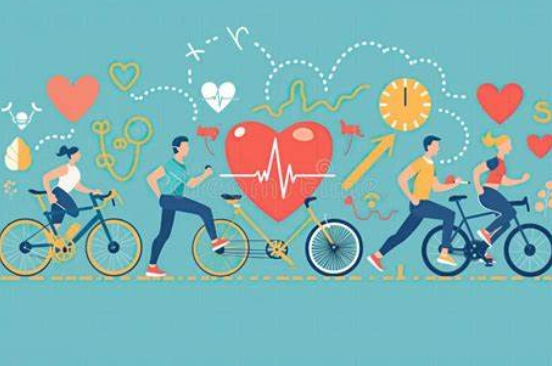Cardiovascular exercise, often referred to as “cardio,” is an essential component of any fitness routine. Whether you’re a seasoned athlete or just starting your fitness journey, cardio offers a wide range of benefits that support both physical and mental health. From improving heart health to boosting energy levels, the impact of regular cardiovascular exercise extends beyond just burning calories. In this article, we will explore the many benefits of cardiovascular exercise and why it should be a key part of your fitness routine for long-term health.
One of the most significant benefits of cardio is its ability to improve heart health. The heart is a muscle, and just like any other muscle in the body, it becomes stronger with regular exercise. Cardiovascular exercise increases the efficiency of the heart by improving blood flow, reducing blood pressure, and lowering the risk of heart disease. By engaging in activities like running, cycling, swimming, or even brisk walking, you strengthen your heart, making it more capable of delivering oxygen and nutrients to the rest of your body.
Regular cardio also helps to lower bad cholesterol (LDL) and raise good cholesterol (HDL). LDL, when elevated, can contribute to plaque buildup in the arteries, increasing the risk of heart attack or stroke. On the other hand, HDL helps to remove LDL from the bloodstream, promoting better cardiovascular health. By including cardio in your routine, you can help maintain a healthy cholesterol balance and reduce the risk of cardiovascular disease.
Cardio is also highly effective for managing weight and improving body composition. Whether you’re looking to lose weight or simply maintain a healthy weight, cardiovascular exercise plays a key role in burning calories. Activities like jogging, cycling, or dancing increase your heart rate, helping you burn fat and boost your metabolism. When combined with a healthy, balanced diet, cardio can be a powerful tool for weight management and fat loss.
In addition to weight management, cardiovascular exercise can improve lung capacity and oxygen efficiency. The more you engage in cardio, the more your lungs adapt to handle increased oxygen intake, allowing you to exercise for longer periods without becoming fatigued. This increased lung capacity improves endurance and stamina, making physical activities such as climbing stairs, walking long distances, or playing sports easier and more enjoyable.
Furthermore, cardio boosts energy levels by improving circulation and oxygen delivery to tissues throughout the body. Regular cardiovascular exercise enhances the efficiency of your cardiovascular and respiratory systems, leading to increased energy and reduced feelings of fatigue. Many people report feeling more energized and alert after a good cardio session, making it a great way to combat sluggishness and boost productivity.
Cardiovascular exercise is also known for its positive effects on mental health. Engaging in cardio activities stimulates the release of endorphins, which are chemicals in the brain that promote feelings of happiness and well-being. This is often referred to as the “runner’s high,” although it can be experienced with any form of cardio. Endorphins help to reduce feelings of stress, anxiety, and depression, making cardio an effective natural mood booster. In addition to endorphins, regular cardio can also reduce levels of cortisol, the stress hormone, helping to manage and reduce stress over time.
Cardiovascular exercise is not only beneficial for your heart and mind, but it also supports overall longevity. Studies have shown that regular cardio can increase life expectancy by improving health markers such as blood pressure, cholesterol, and blood sugar levels. By keeping your body in peak condition through consistent cardio, you’re reducing the risk of chronic diseases like type 2 diabetes, stroke, and certain cancers, leading to a healthier, longer life.
Another benefit of cardio is that it improves sleep quality. Regular physical activity has been shown to help regulate sleep patterns and promote deeper, more restful sleep. For individuals who struggle with insomnia or poor sleep quality, engaging in cardio exercises during the day can help the body relax at night, making it easier to fall asleep and stay asleep. Better sleep quality, in turn, contributes to better physical and mental health.
The great thing about cardiovascular exercise is that it’s versatile and can be adapted to fit different fitness levels and preferences. Whether you prefer running outdoors, cycling, swimming, dancing, or even participating in group fitness classes, there’s a cardio activity that works for everyone. You don’t need to spend hours at the gym to reap the benefits of cardio—simple activities like walking or using a stationary bike at home can have a significant positive impact on your health.
To get the most out of cardiovascular exercise, aim for at least 150 minutes of moderate-intensity or 75 minutes of high-intensity cardio each week, as recommended by health organizations like the American Heart Association. You can break this time into shorter sessions, such as 30 minutes of cardio five days a week. If you’re new to cardio or returning after a break, start slowly and gradually increase the intensity and duration of your workouts.
In conclusion, cardiovascular exercise is a cornerstone of overall health and wellness. From improving heart health and lung capacity to boosting energy levels and mental well-being, the benefits of cardio extend far beyond just weight loss. By incorporating regular cardio into your fitness routine, you’re not only improving your cardiovascular health but also enhancing your quality of life, longevity, and emotional well-being. Whether you’re walking, running, swimming, or cycling, make cardiovascular exercise a consistent part of your fitness routine, and enjoy the lifelong benefits it offers.




